Colloque Limits to Growth
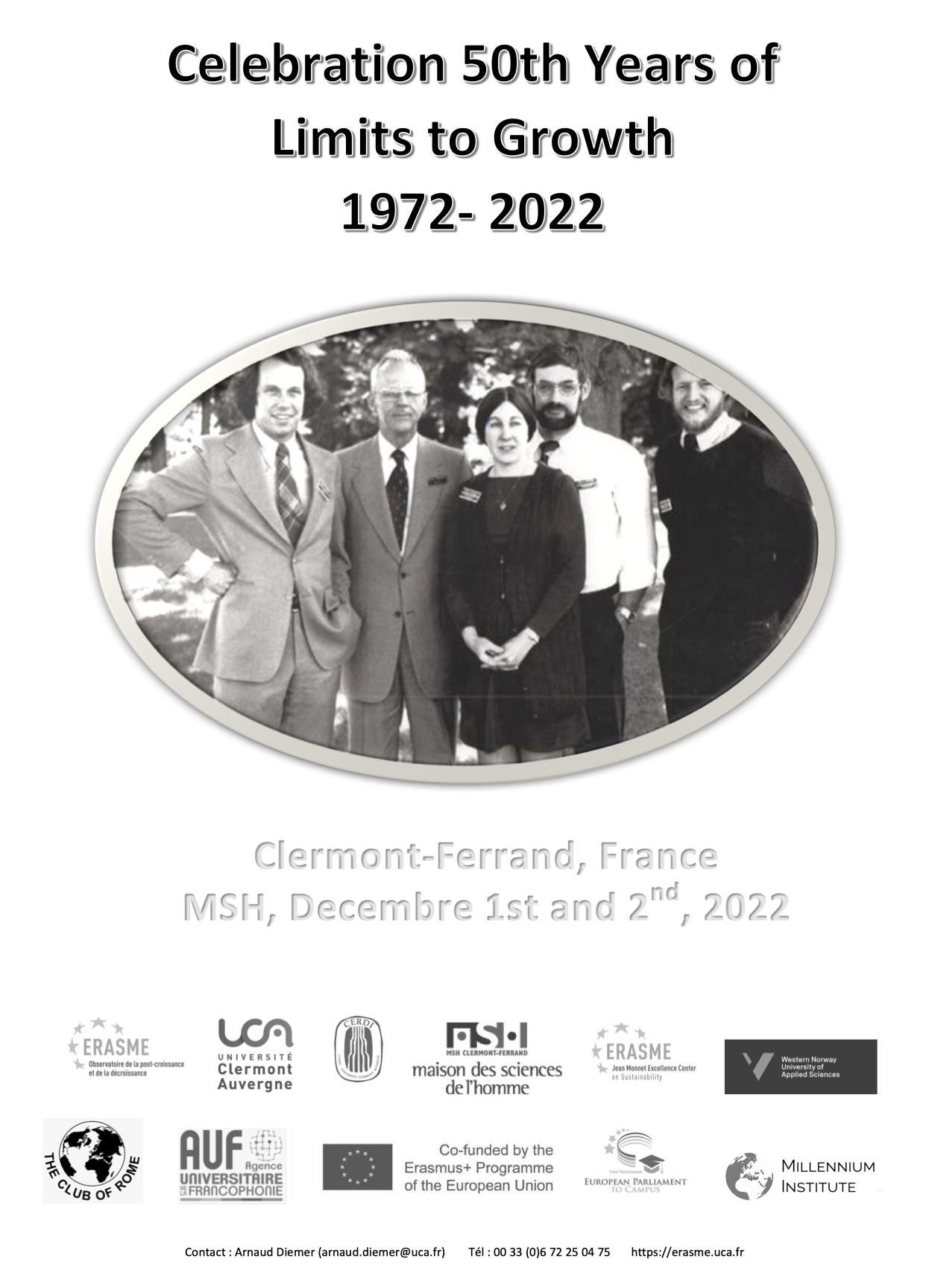
2022, marque les 50 ans de la publication de Limits to Growth, encore appelé Rapport Meadows. Ce rapport a été commandé par le Club de Rome au MIT. Colloque programmé les 1-2 décembre 2022 à Clermont-Ferrand
50’s Years Birthday of « LIMITS TO GROWTH » (1972 - 2022)
December 1st and 2nd, 2022
Clermont-Ferrand, France
Maison des Sciences de l’Homme
In August 1970, the Club of Rome asked the MIT Study Group on Systems Dynamics to undertake a study of trends in a number of factors that were disrupting society. This group sought to define the physical limits to population growth and the constraints resulting from their economic activities on the planet. The problematic of the authors of the Meadows report (1972), with the evocative title "Limits to Growth", was defined as follows: "In this context, men are confronted with strangely irreducible and equally elusive theories of problems: Environmental deterioration, institutional crisis, bureaucracy, uncontrollable urban sprawl, job insecurity, alienation of youth, increasing rejection of the value systems recognized by our societies, inflation and other monetary and economic disturbances...These seemingly different problems have three characteristics in common. Firstly, they extend to the whole planet and appear there from a certain threshold of development whatever the dominant social or political systems. Second, they are complex and vary according to technical, social, economic and political elements. Finally, they act strongly on each other in ways we do not yet understand" (1972, p. 139). In order to obtain a general assessment of the world situation, the MIT group chose a specific analytical method, developed by Forrester (1971), called system dynamics. The latter would allow a graphical and numerical representation of all planetary relationships in easily understandable terms. The main objective of MIT was thus the recognition in a global context of the interdependencies and interactions of 5 critical factors: population explosion, food production, industrialization, depletion of natural resources and pollution.
Despite some criticism from economists, Limits to Growth quickly became a best-seller, translated into several languages and whose main results (the collapse hypothesis) were reported in the Press. Limits to Growth will be reissued in 1992 and in 2002, the simulations of the model will even be the subject of parallel works, reiterating the numerous conclusions of the original report.
The organisers of the International Colloquium "50 Years of the Limits to Growth Report" intend to celebrate this anniversary by proposing to the contributors to focus on the following issues
1° A presentation of the social, economic, environmental and political context in which the Limits to Growth report was written. Proposals could focus on analysing the links between the OECD, the Club of Rome and the authors of the report or on placing the report in the context of the Stockholm Summit.
2° An analysis of the Limits to Growth report, specifying its strengths and weaknesses, its main results, the methodology used (system dynamics), the type of model (simulation model), the computer programming used, its possible extensions (simulation games) or its articulation with the more technical Dynamics of Growth In a Finite World.
3° A study of the reactions to the publication of the report, in particular those of the Press and economists, the criticism of World 2 (Forrester - Nordhaus), the consequences of the first oil shock, the response of economists to the projections of the World 3 model... comparisons in terms of methods (Systems Dynamics and Econometrics), the reference to the Steady State (Daly)
4° An analysis of World 3 within the family of Integrated Assessment Models (IAM), more precisely a study of the place of World Models. Overview of the validation of the World 3 computing model and alternative modelling solutions. Proposals could provide progress-oriented ideas for developing useful models aimed at a sustainable society.
5° A reexamination of the results from the 1972, 1992 and 2002 editions in the light of new frameworks of reflection: the Planetary Boundaries (Rockstrom, 2009), a revision of World 3 (Turner, 2011), the circles of social life (James, 2015), the economics of Doughnuts (Raworth, 2017)... The actuality of the theses defended by the Limits to Growth report.
Program and registration are available on https://limitstogrowth.sciencesconf.org
The contributions of the Symposium will be published in a collective book (in english).
Organisational Committee: Arnaud Diemer, Cécile Batisse, Eduard Nedelciu, Manuel Morales, Henri Sourgou, Felix Garnier
Scientific Commitee: Yves-Marie Abraham (HEC Montréal, Quebec, Canada), Robert Ackrill (Nottingham Business School, UK), Aleix Altimiras (UNICAMP, Brazil), Najet Aroua (Polytech Alger, Algeria), Loubna Barmaki (Mohammed V University, Marocco), Bartosz Bartniczak (Wroclaw University of Economics and Business, Poland), Annie Beka Beka (Ecole Normale Supérieure, Gabon), Salim Belyazid (Stockholm University), David Collste (Stockholm Resilience Center, Sweden), Robert Costanza (Crawford School of Public Policy, Australia), Brynhildur Davidsdottir (Iceland University, Iceland), Darren McCauley (Erasmus University, Netherlands), Valeria Schwanitz (HVL, Norway), Birgit Kopainsky (University of Bergen, Norway), Marko Debeljak (Josef Stefan Institute, Slovenia), Sylvie Ferrari (University of Bordeaux, France), Romeal Eboue (University of Douala, Cameroon), Giorgos Kallis (ICREA, Spain), Mirjana Radovanovic (Educons University, Serbia), Franck Dominique Vivien (University of Reims Champagne Ardenne, France), August Wierling (HVL, Norway), Fabrice Flipo (Institut Mines - Telecom, France), Mark Meyer (GWS, Germany), Kenneth Rijsdjik (University of Amsterdam, netherlands), Gökçe Manavgat (Toros University, Turkey), Pinar Ozuyar (Istinye University, Turkey), Valeria Di Cosmo (University of Turin, italy), Alessandro Sciullo (University of Turin, Italy), Paul James (University of Sydney, Australia), Jean-Denis Mathias (INRAE, France), Robert Costanza (University of Melbourne, Australia), Vilma Atkociuniene (Magnus Vytautas University, Lituania), Josée Provinçal (AQPER, Quebec, Canada), Matteo Pedercini (Millennium Institute, USA), Marie Schellens (UNEP, Belgium), David Collste (SRC, Sweden), Jennifer Hinton (Postgrowth institute, USA), Donnie McLaurie (Postgrowth institute, USA), Jenneth Parker (Schumacher Institute, UK), Ian Roderick (Schumacher Institute, UK), Mariola Zalewska (University Warsaw, Poland), Ianos Ian (Bucharest University, Roumania), Andrei Orlov (Nizhny Novgorod State Technical university, Russia), Calvin Jones (Cardiff University, New Wales), Aneta Trajanov (IJS, Slovenia), Nuno Videira (NOVA, Portugal), Peter Victor (York University, Canada), Frank Uekotter (University of Birmingham, UK), Paulo Marques (Sao Paulo University, Brazil), Bruno Villalba, AgroParisTech, France), Jaroslaw Gorecki (Bydgoszcz University of Science and Technology, Poland).
Keynote Speakers
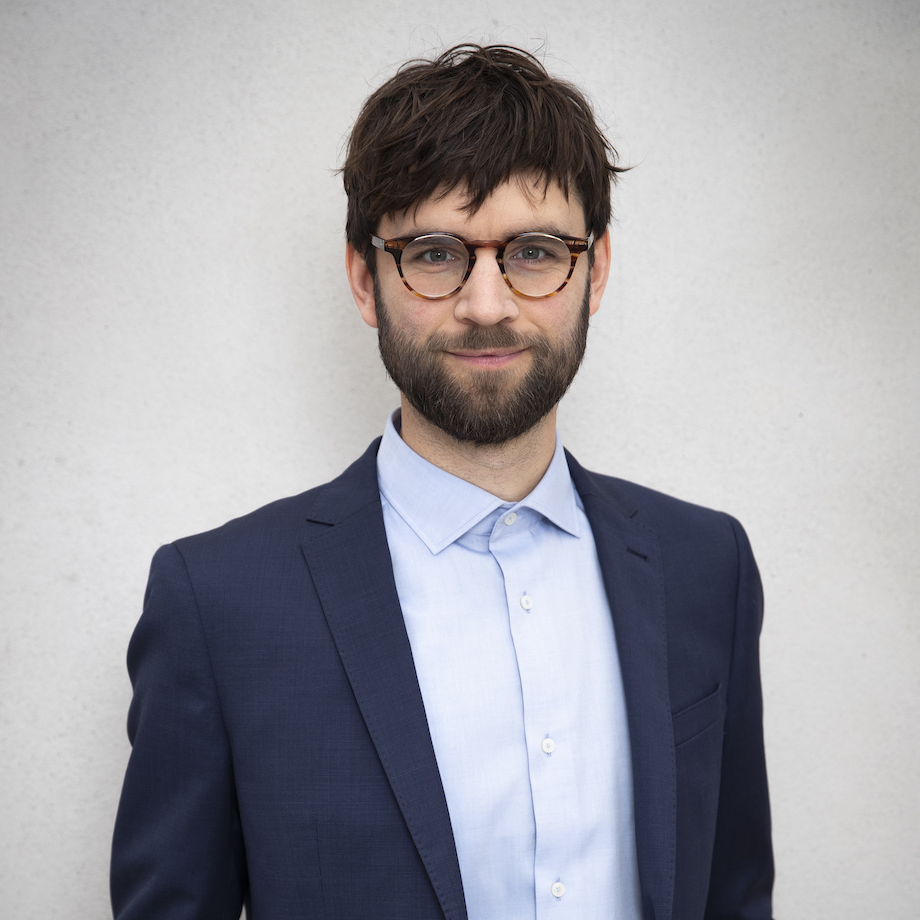
David Collste is a researcher at the Planetary Boundaries group where he studies feedback between human development, the economy, and planetary boundaries. He works within the Earth4All project on global modeling and the XPaths project on pathways to the SDGs in drylands. He co-leads the graduate module on systems thinking and leads the undergraduate course in ecological economics. Collste worked co-edited the reportEconomy and Finance for a Just Future on a Thriving Planet commissioned by the Swedish Ministry of Environment for the United Nations meeting Stockholm+50 in 2022. Collste holds a joint PhD degree in Sustainability Science and Economics from Stockholm Resilience Centre and Université Clermont Auvergne.
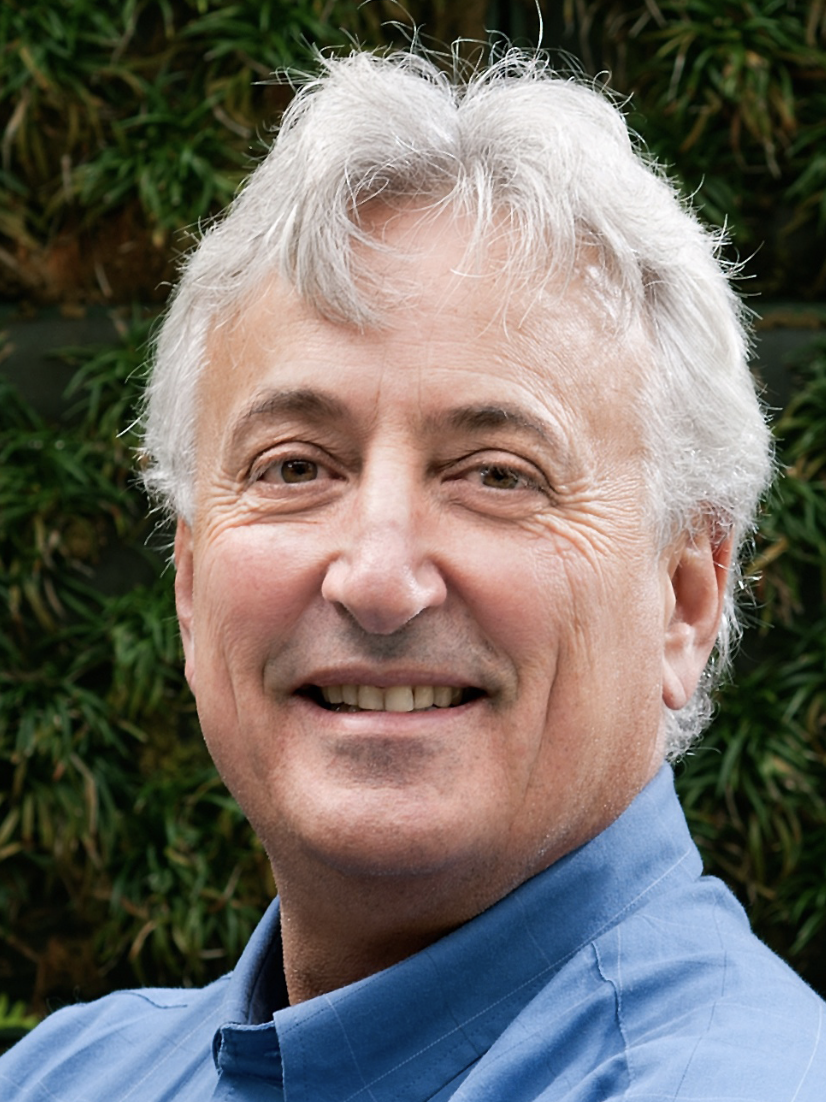
Robert Costanza is Professor of Ecological Economics at the Institute for Global Prosperity (IGP) at University College London (UCL). He is also currently a Senior Fellow at the Stockholm Resilience Centre in Stockholm, Sweden, and Honorary Professor at the Australian National University, an Affiliate Fellow at the Gund Institute at the University of Vermont, and a deTao Master of Ecological Economics at the deTao Masters Academy in Shanghai, China. He is a Fellow in the Academy of Social Sciences in Australia (ASSA) and the Royal Society of Arts (RSA) in the UK, and is an Overseas Expert in the Chinese Academy of Sciences (CAS). Professor Costanza’s transdisciplinary research integrates the study of humans and the rest of nature to address research, policy and management issues at multiple time and space scales, from small watersheds to the global system. His specialties include: transdisciplinary integration, systems ecology, ecological economics, ecosystem services, landscape ecology, integrated socio-ecological modeling, ecological design, energy analysis, environmental policy, social traps and addictions, incentive structures, and institutions


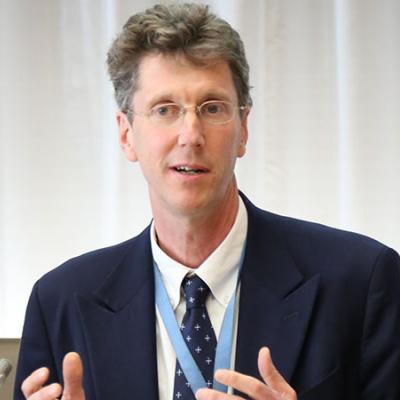
Steven Stone joined UNEP in 2010, in the lead up to the Rio+20 Conference. While at UNEP, Steven has served as Chief of the Economics and Trade Branch, where he directed a team dedicated to furthering the knowledge base, outreach and support to countries on environmental and resource economics as key components of economic, trade and investment policy; and from 2017-2021 as Chief of the Resources and Markets Branch, which brought additional elements of sustainable consumption and production, life cycle analysis, and global flows of material resources via the International Resources Panel. Some of the key flagships he has helped to shape and incubate over time include the Green Economy Initiative, the Economics of Ecosystems and Biodiversity (TEEB), the Green Growth Knowledge Partnership, and the Partnership for Action on Green Economy (PAGE), which will be key for the delivery of the UNEP Medium-Term Strategy.
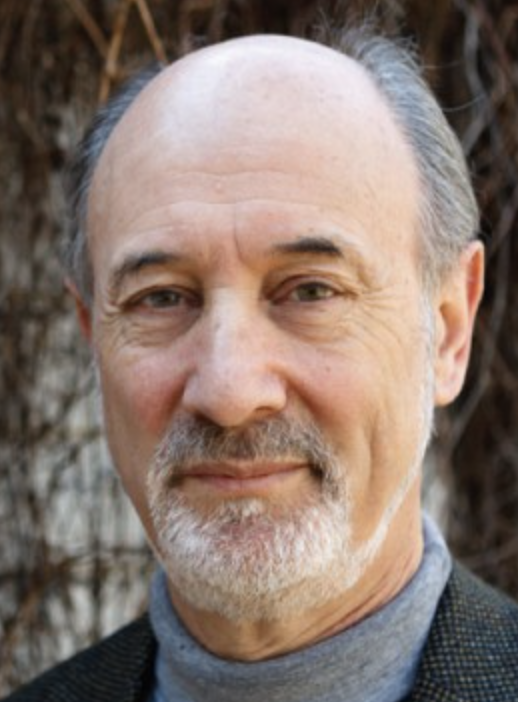
Peter Victor, author of Herman Daly's Economics for a Full World: His Life and Ideas (2021) and Managing without Growth. Slower by Design, not Disaster (2008 and 2019), is Professor Emeritus and Senior Scholar at York University, Canada. He has worked for 50 years in Canada and abroad on economy and environment issues as an academic, consultant and public servant. His work on ecological economics has been recognized through the award of the Molson Prize in the Social Sciences by the Canada Council for the Arts in 2011, the Boulding Memorial Prize from the International Society for Ecological Economics in 2014, and his election to the Royal Society of Canada in 2015. Peter was the founding president of the Canadian Society of Ecological Economics and is a past-president of the Royal Canadian Institute for Science.
Les 50 ans de la publication de Limits to Growth, 1972 - 2022
1er et 2nd Décembre 2022
Clermont-Ferrand, France
En août 1970, le Club de Rome a demandé au Groupe d’Etude de Dynamique des Systèmes du MIT, d’entreprendre l’étude des tendances d’un certain nombre de facteurs qui déréglaient la société. Ce groupe a cherché à définir les limites matérielles qui s'opposent à la croissance démographique de la population et les contraintes résultant de leurs activités économiques sur la planète. La problématique des auteurs du rapport Meadows (1972), au titre évocateur « Limits to Growth » fût ainsi définie de la manière suivante : « Dans ce contexte, partout les hommes sont confrontés à des théories de problèmes étrangement irréductibles et tout aussi insaisissables : détérioration de l’environnement, crise des institutions, bureaucratie, extension incontrôlable des villes, insécurité de l’emploi, aliénation de la jeunesse, refus de plus en plus fréquent des systèmes de valeurs reconnus par nos sociétés, inflation et autres dérèglements monétaires et économiques…Ces problèmes en apparence différents ont en commun, trois caractéristiques. Premièrement, ils s’étendent à toute la planète et y apparaissent à partir d’un certain seuil de développement quels que soient les systèmes sociaux ou politiques dominants. Deuxièmement, ils sont complexes et varient en fonction d’éléments techniques, sociaux, économiques et politiques. Finalement, ils agissent fortement les uns sur les autres et cela d'une manière que nous ne comprenons pas encore » (1972, p 139). Afin d’obtenir une évaluation générale de la situation du monde, le groupe du MIT a choisi une méthode analytique spécifique, mise au point par Forrester (1971), la dynamique des systèmes. Cette dernière permettrait une représentation graphique et numérique de toutes les relations planétaires, en termes facilement compréhensibles. L’objectif principal du MIT était ainsi la reconnaissance dans un contexte mondial des interdépendances et interactions de 5 facteurs critiques : explosion démographique, production alimentaire, industrialisation, épuisement des ressources naturelles et pollution. Malgré certaines critiques émanant des économistes, Limits to Growth est très vite devenu un best-seller, traduit en plusieurs langues et dont les principaux résultats (hypothèse du collapse) furent relayés par la presse. Limits to Growth sera réédité en 1992 et en 2002, les simulations du modèle feront même l’objet de travaux parallèles, réitérant les nombreuses conclusions du rapport originel.
Les organisateurs du Colloque international “Les 50 ans de la publications du Rapport “Limits to Growth” entendent célébrer cette date anniversaire en proposant aux contributeurs de s’attacher aux problématiques suivantes :
1° Une présentation du contexte social, économique, environnemental et politique durant lequel le rapport Limits to Growth a été rédigé. Les propositions pourront s’attacher à analyser les liens entre l’OCDE, le Club de Rome et les auteurs du Rapport ou encore à replacer le rapport dans le cadre du Sommet de Stockholm.
2° L’analyse du rapport Limits to Growth, en précisant ses forces et ses faiblesses, ses principaux résultats, la méthodologie utilisée (la dynamique des systèmes), le type de modèle (modèle de simulation), la programmation informatique mobilisée, ses extensions possibles (jeux de simulation) ou encore son articulation avec l’ouvrage plus technique Dynamics of Growth In a Finite World.
3° L’étude des réactions à la parution du Rapport, notamment celle de la presse et des économistes, la critique de World 2 (Forrester - Nordhaus), les conséquences du 1er choc pétrolier, la réponse des économistes aux projections du modèle World 3… les comparaisons en termes de méthodes (Systems Dynamics and Econometrics), la référence au Steady State (Daly)
4° Une analyse de World 3 au sein de la famille des modèles d’intégration assignée (IAM), plus précisément une étude de la place des World Model.
5° La relecture des résultats tirés des éditions de 1972, 1992 et 2002 à l'aune de nouveaux cadres de réflexion : les Limites Planétaires (Rockstrom, 2009), une relecture de World 3 (Turner, 2011), les cercles de vie sociale (James, 2015), l’économie du Doughnuts (Raworth, 2017)... L’actualité des thèses défendues par le rapport Limits to Growth.
Le programme et les inscriptions au colloque se font sur la plateforme : https://limitstogrowth.sciencesconf.org
A l’issue du colloque, les contributions seront publiées dans un ouvrage collectif (anglais)
Comité d’organisation : Arnaud Diemer, Cécile Batisse, Eduard Nedelciu, Manuel Morales, Henri Sourgou, Felix Garnier
Comité scientifique : Yves-Marie Abraham (HEC Montréal, Quebec, Canada), Robert Ackrill (Nottingham Business School, UK), Aleix Altimiras (UNICAMP, Brazil), Najet Aroua (Polytech Alger, Algeria), Loubna Barmaki (Mohammed V University, Marocco), Bartosz Bartniczak (Wroclaw University of Economics and Business, Poland), Annie Beka Beka (Ecole Normale Supérieure, Gabon), Salim Belyazid (Stockholm University), David Collste (Stockholm Resilience Center, Sweden), Robert Costanza (Crawford School of Public Policy, Australia), Brynhildur Davidsdottir (Iceland University, Iceland), Darren McCauley (Erasmus University, Netherlands), Valeria Schwanitz (HVL, Norway), Birgit Kopainsky (University of Bergen, Norway), Marko Debeljak (Josef Stefan Institute, Slovenia), Sylvie Ferrari (University of Bordeaux, France), Romeal Eboue (University of Douala, Cameroon), Giorgos Kallis (ICREA, Spain), Mirjana Radovanovic (Educons University, Serbia), Franck Dominique Vivien (University of Reims Champagne Ardenne, France), August Wierling (HVL, Norway), Fabrice Flipo (Institut Mines - Telecom, France), Mark Meyer (GWS, Germany), Kenneth Rijsdjik (University of Amsterdam, netherlands), Gökçe Manavgat (Toros University, Turkey), Pinar Ozuyar (Istinye University, Turkey), Valeria Di Cosmo (University of Turin, italy), Alessandro Sciullo (University of Turin, Italy), Paul James (University of Sydney, Australia), Jean-Denis Mathias (INRAE, France), Robert Costanza (University of Melbourne, Australia), Vilma Atkociuniene (Magnus Vytautas University, Lituania), Josée Provinçal (AQPER, Quebec, Canada), Matteo Pedercini (Millennium Institute, USA), Marie Schellens (UNEP, Belgium), David Collste (SRC, Sweden), Jennifer Hinton (Postgrowth institute, USA), Donnie McLaurie (Postgrowth institute, USA), Jenneth Parker (Schumacher Institute, UK), Ian Roderick (Schumacher Institute, UK), Mariola Zalewska (University Warsaw, Poland), Ianos Ian (Bucharest University, Roumania), Andrei Orlov (Nizhny Novgorod State Technical university, Russia), Calvin Jones (Cardiff University, New Wales), Aneta Trajanov (IJS, Slovenia), Nuno Videira (NOVA, Portugal), Peter Victor (York University, Canada), Frank Uekotter (University of Birmingham, UK), Paulo Marques (Sao Paulo University, Brazil), Bruno Villalba, AgroParisTech, France), Jaroslaw Gorecki (Bydgoszcz University of Science and Technology, Poland).
Organisateurs
Arnaud Diemer
Cécile Batisse
Timothy Marcroft
Manuel Morales
Henri Sourgou
Félix Garnier
